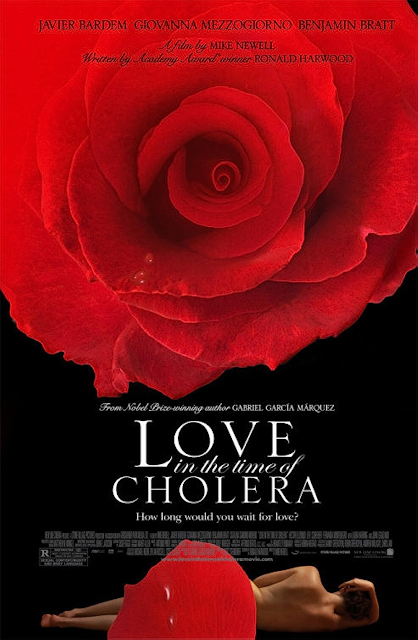AFTER WATCHING “Raymond & Ray” which was directed by the son of Columbian Nobel prize winner Gabriel Garcia Marquez, we decided to watch “Love in the Time of Cholera”, published in 1985 and filmed in 2007, the only book of Marquez made into film.
The film is directed by Mike Newell (“Four Weddings & a Funeral”, “Mona Lisa Smile”) and the story spans 50 years from the 1880s to 1930s.
It starts with Doctor Juvenal Urbino (Benjamin Bratt) trying to get his pet parrot on top of a tree but he falls while trying to reach for the bird and dies.
His wife Fermina (Giovanna Mezzogiorno) runs to him and tells her before he dies: “Only God knows how much I love you.”
Soon, Florentino Ariza (Javier Bardem) visits her to proclaim his undying love for her but she tells him to get out.
From there, their story is told in flashback. Florentino is a telegraph boy (played as a young man by Unax Ugalde) who delivers a message to Fermina’s dad (John Leguizamo in an atrocious performance) and falls head-over-heels in love with her at first sight.
He writes to her and she responds. but their secret relationship is discovered by Fermina’s dad and she is taken away to a faraway place.
After being away for sometime, her father returns her to their own place and Florentino eagerly visits her, but she tells him their relationship before is just an illusion. Florentino swears to be loyal to her and gets so depressed.
Fermina then meets Dr. Urbino, who is rich and can give her security so her dad urges her to marry him, and she does. To get over Fermina, Florentino is encouraged by his mother (Fernanda Montenegro, the Brazilian actress of “Central Station”) to bed other women, pushing a widow to sleep with him.
He enjoys the sex and realizes it helps him forget the pain of a broken heart. He becomes promiscuous and makes a journal of his sexcapades, making a total of 622 trysts with various women.
Through the years, Fermina and Urbino experience the joys, pains and reality of marriage.
Urbino has an affair with a black woman but Fermina is able to forgive him. Eventually, Fermina learns to accept Florentino’s genuine love for her and love finally blossoms between them in their old age, much to the chagrin of Fermina’s daughter.
When the film was released, it was vilified by most western critics who, in effect, said that the book is definitely better than the movie which captures Colombian culture and sensibility to make it a great literary experience.
But that’s usually the reaction when a great novel is adapted for the big screen. We also complained when we saw David Lean’s “Dr. Zhivago” in 1965 because we love Boris Pasternak’s novel so much.
But when we saw it again five decades later in its restored version, we realized that Lean did his best and film is most certainly a totally different medium from the written word, so it’s unfair to keep on comparing a book to their cinematic interpretations.
We haven’t read Marquez' book so we cannot make any comparisons.
But judging the movie as it is, it has very handsome production values and is an elegant period piece that is well crafted, with great cinematography and a magnificent musical score.
Maybe what it lacks is the magic realism that Marquez is noted for in “100 Years of Solitude”.
Newell is more of a realistic director when the material needs more intense passion and a bit of frivolous whimsy.
Benjamin Bratt fits his role as the dignified doctor with a goatee in a black coat.
Giovanna Mezzogiorno is so beautiful on screen. Unlike Florentino who’s played by two actors, she plays Fermina all throughout and she’s just as convincing as the young girl in the throes of first love and as the old but handsome woman who has a nude scene to show her sagging body.
Her beauty is perfect for the role as it has the kind of inaccesssibility that Fermina calls for.
It is Javier Bardem who we feel is miscast as a romantic hero like Florentino who’s also a poet.
To begin with, the actor who plays his younger self is so good looking you wouldn’t believe he’d look like Bardem when he grows old.
You also won’t believe that Bardem is so irresistible to randy women that they’d just wantonly pull him into their bed.
Bardem did this movie in 2007, the same year he did “No Country for Old Men” which won him an Oscar in his role as a ruthless psychotic hitman, where he’s certainly much more believable.







.jpg)

